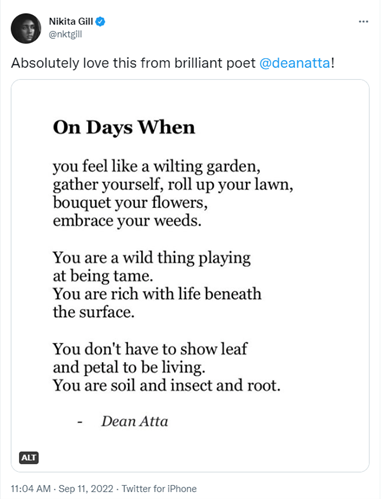This post was written by NCTE Member Brett Vogelsinger.
Teaching writing is difficult, and sometimes a new approach can provide a productive interruption to the writers we teach. This is part of what draws me to “poetry pauses,” brief detours into reading poems as mentor texts for writing.
Sometimes, my students write their own poetry in English class — all students should — but more often, a poetry pause involves reading a poem with an eye on what craft techniques we can apply to other writing, to pieces that argue, inform, tell a story, or analyze.
The first major writing assignment my students complete each year is their Autobiography of a Reader piece. Students recreate scenes from their reading lives with imagery, then step back to examine why those moments mattered, in a blend of narrative and informative writing.
After students have drafted the heart of their pieces, we turn our attention to how they might craft an excellent introduction. A poem I recently discovered on Twitter by Dean Atta leads the way.

(A side note: If you want to read more poetry or find more poems as mentor texts, start following poet Nikita Gill on Twitter.)
“Don’t we all feel like a wilted garden sometimes?” I say. “But look how reassuring this poem is! What is he telling us in the end?” We discuss this a bit.
For my ninth-grade students, it only takes moments to review what simile and metaphor mean, and soon we discover that something happens in this poem that we can apply in all sorts of writing. The poem opens with a simile to introduce an idea, then extends the comparison with metaphors in the sentences that follow.
“Try this as an introduction for your Autobiography of a Reader. ‘Books are like . . . Reading is like . . .’ Finish the simile and then keep exploring that idea with some metaphor in the sentences that follow. That can make an engaging introduction for a reader as you invite them into the scenes you’ve written.”
Here are a few examples of what my students created in the opening paragraphs of their final submissions:
To me, books are like a new home but hidden between the thin, brittle pages. I am a lover of traveling. I love exploring each end of the world and starting in one country and moving to the next. . . .The only difference between traveling and reading is that with a book, I am stuck between the limited pages. I read to find a new world because sometimes, this world is not enough for me. There are no dragons, or castles, or vampires, but for a few pages, I can pretend. Reading takes me to places I could only dream of going in real life. In a book, I never stop moving. I am never bored. —Joanna
Books are overflowing with wisdom and knowledge. Each page turned is another rep, and your book is your gym. Some books are like a quick workout, while others leave your brain Arnold Schwarzenegger buff. Each time you read, your brain builds more muscle. Let us take a few looks at some of my previous reading choices. —Francisco
Reading is like a tall waterslide, the giant ones you see at waterparks. They have a ladder of many winding steps that tangle with other sets of stairs. You squint at the structures from the outside, deciding which one might be the most thrilling. Although we are warned not to, most of us judge books by their cover, some are just more appealing than others. You start out by dragging your float behind you, trudging your way up one slippery step at a time, looking up trying to guess how long your line will be. Starting out a new book is like starting at that first step, knowing you have so much to go, looking up to guess the turnout and plot of the rest. —Madeline
These introductions were simply written in the writer’s notebook after a pause to examine a poem, revised by the student, and incorporated into a completely new genre.
This reminds me of the power of poetry pauses, and makes me excited to see what these students can do next. It is only October!
It is the policy of NCTE in all publications, including the Literacy & NCTE blog, to provide a forum for the open discussion of ideas concerning the content and the teaching of English and the language arts. Publicity accorded to any particular point of view does not imply endorsement by the Executive Committee, the Board of Directors, the staff, or the membership at large, except in announcements of policy, where such endorsement is clearly specified.

Brett Vogelsinger teaches ninth-grade English in Bucks County, Pennsylvania. He is the author Poetry Pauses: Teaching With Poems to Elevate Student Writing in All Genres, available from Corwin Literacy. He is the founder of Go Poems, and a frequent contributor and webinar creator for Moving Writers. Connect on LinkedIn or @theVogelman on Twitter or at his website, www.brettvogelsinger.com.

